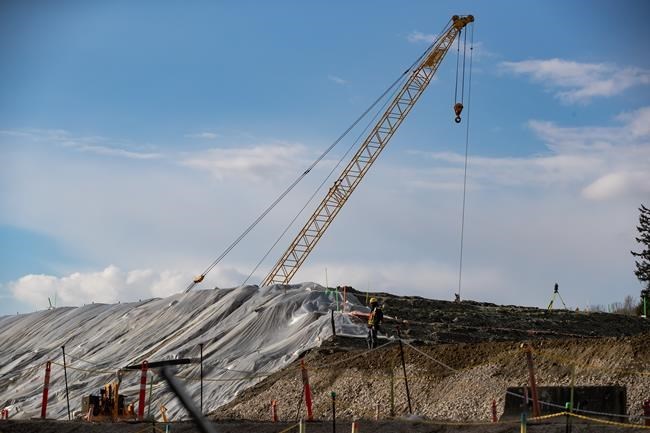CALGARY — The approvals process for major projects in Canada continues to be slow and cumbersome under revamped environmental assessment legislation, according to a new report.
The report, released Monday by the Canada West Foundation — a Calgary-based think-tank — analyzed the 25 projects submitted under the federal Impact Assessment Act since it came into force three-and-a-half years ago. It found almost all of the projects submitted under the legislation remain in the first two phases of a four-part process.
That's concerning, said report author Marla Orenstein, given that the Impact Assessment Act — formerly known as Bill C-69 — was intended to speed up the application process for major infrastructure and resource projects in the country.
"These projects are complex and nuanced and have a great deal of impact ... that’s why they wound up in the review process in the first place," Orenstein said.
“At the same time, it’s not terribly encouraging that three-and-a-half years in, we’re seeing projects just entering Phase 2 of a four-phase process. This doesn’t seem to bode well for getting projects out the other side in a relatively tidy way.”
The Impact Assessment Act's predecessor, the Canadian Environmental Assessment Act of 2012, was also regularly criticized for its excessively long project approval timelines. Under that process, according to Canada West Foundation data, it took almost 3.5 years on average for projects to either receive approval or be terminated, with some projects taking over 10 years.
Orenstein said while it's good that Canada's regulatory process is robust and thorough, the federal government is facing a looming 2030 deadline to meet its own climate goals of reducing the country's greenhouse gas emissions by 40 to 45 per cent below 2005 levels.
She added doing so will require large-scale and swift deployment of infrastructure — everything from carbon capture and storage technology to hydrogen facilities to electricity transmission lines.
"It takes a long time to plan projects and to build them," Orenstein said.
"If something takes eight years or six years just to get through a regulatory process, we have no hope of meeting those net-zero goals. It just can't happen."
The Liberal government announced in its federal budget in March that it will unveil a plan aimed at speeding up the permitting process for major infrastructure projects before the end of the year.
The government also earmarked $1.3 billion in Budget 2023 to be used by the Impact Assessment Agency of Canada, the Canada Energy Regulator and 10 other departments to improve regulatory efficiency.
“I think there is a real recognition from the federal government that this is a problem, and this is an obstacle to achieving their targets," said Mike Holden, chief economist of the Business Council of Alberta, which counts among its members some of the country's largest energy companies.
For much of the past decade, Canada's energy sector has complained of lengthy permitting timelines and regulatory uncertainty slowing down everything from major oil pipeline projects to the development of a liquefied natural gas (LNG) industry in this country.
Holden said it's difficult to measure the cost of regulatory delays and difficulties to the Canadian economy. Project proponents, investors, host communities, Indigenous groups and taxpayers all bear some of the financial burden.
But Holden said perhaps the biggest economic damage comes in the form of opportunity loss, in that some companies may choose to not put projects forward at all rather than face an unclear regulatory process and timeline.
"Because right now they're being asked to invest sometimes hundreds of millions of dollars, and sometimes years and years of process, into an uncertain outcome at the end of the day," he said. "And that's a tough ask for a lot of businesses."
Under the legislation, the Impact Assessment Agency is mandated to complete the first phase of the approvals process — the "planning" phase — within 180 days of the project's application.
However, that process may also be extended via “stop clock” requests by the project proponents. According to the Canada West Foundation, 80 per cent of the projects currently within the federal review process required a clock stoppage for reasons that included the pandemic, additional time for Indigenous consultation and ballooning requirements for information from proponents.
This meant that though the Impact Assessment Agency consistently met its legislated deadline of 180 days, with clock stoppages it took projects an average of 332 days to complete Phase 1.
Major projects that fall under the federal Impact Assessment Act include pipelines, mining, nuclear power facilities, liquefied natural gas (LNG) facilities, transmission lines, oilsands mines and fossil-fuel powered electricity generation facilities.
South of the border, companies have raised similar complaints about regulatory slowness and permitting delays. U.S. President Joe Biden has pledged to improve communication and co-operation among federal agencies to accelerate permitting and environmental reviews in that country.
This report by The Canadian Press was first published May 1, 2023.
Amanda Stephenson, The Canadian Press



